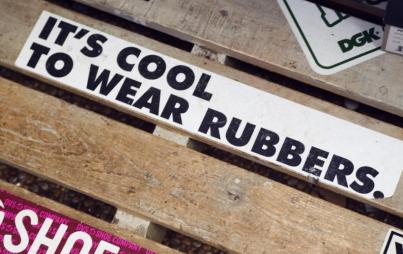
Some stuff isn't taught.
They say, “Teach the class you wanted to take.” Teaching a 15-week creative writing course, I invented the "instant gratification takes too long” method, with the goal: “write and publish a great piece by the end of the class.”
As a professor, every September I preach the importance of showing up and focusing to my students while hiding a secret: I was a lousy student. Luckily, my youthful dissatisfaction with higher education led me to become the professor I wished I had. Over two decades, I’ve taught more than 15,000 pupils of all ages, some who’ve studied with me multiple times. Here’s some advice on how school can help you jumpstart a better future that I wished I heard earlier:
1. Be A Team Player: In high school and college, I was a rebel who thought it was cool to be a loner, rejecting groups for political reasons I’ve now forgotten. Years later, when I was broke and struggling, I quickly attempted to catch up, joining alumni associations, religious organizations, as well as professional circles (like ASJA, NBCC, PEN American Center.) My advice is: Don’t be late to the party. Try a group, whether it’s the yearbook, school newspaper, humor magazine, theatre, glee club, debate team, student council, or marching band, to explore your passion and cultivate future colleagues.
At Williams College, my husband collaborated with his classmate, the composer William Finn (which led to Finn’s Tony-winning Falsettos and my spouse’s subsequent TV jobs on SNL, Seinfeld, and Law & Order). I recently participated in a book event with my pal Brian O’Connor, a Detroit News columnist, who worked on my high-school yearbook and later as an editor I freelanced for. Former classmates will more likely give you a shot or referral.
2. Pursue Mentors: I used to see my classmates as soulmates and teachers as intimidating tweedy oldsters that assigned homework. The only outside-of-class contact I had with my professors was begging for extensions on papers. In grad school, after bothering my favorite teacher twice, he recommended me for my first magazine job at The New Yorker. I realized: Hey ,these professors could be useful . . . if you pursue help. I’ve since assisted ambitious protégés in landing part-time and full-time gigs. Emails from strangers asking, “Can you get me an internship job/agent/editor?” go ignored. (Especially after Googling reveals their beer-drinking, half-naked social media pics.) Yet someone in my classroom can easily impress me: One student walked me home after class to say how she’d loved my first assignment, and wound up with a job. (Hint: start with flattery.) My brother coauthored a scientific paper with his professor, which sparked his successful trauma surgery career.
3. Set Goals Each Semester: As a liberal arts major with a penchant for poetry, I stuck to my subject, trying only for a decent grade and credit. In retrospect, I should have acquired an edge in the real world. I later learned that journalism was literature with ADD, and it wasn’t difficult to publish a three-page essay or op-ed.
They say, “Teach the class you wanted to take.” Teaching a 15-week creative writing course, I invented the "instant gratification takes too long” method, with the goal: “write and publish a great piece by the end of the class.” Happily, students broke into — and some were paid by — top US newspapers and magazines. Several students launched books and professions as columnists and editors — by just stating the intent, half the class fulfilled it. Remember, if your teacher isn’t aiming you higher, aim yourself.
4. Complete More Than Course Work: I was proud of my degrees. Yet while paying high tuition prices (now astronomical) for that sheepskin, I might have also achieved something more tangible. Pick courses, extracurricular or independent studies to assist you in creating a book, theatrical project, sketch comedy show, screenplay, dance montage, photography exhibit, academic study, blog, video game, or computer app. It doesn’t have to be brilliant, just done by graduation. My 21-year-old student Aspen Matis focused on a 30-page book proposal as a sophomore, which led to a memoir with HarperCollins. Everyone in business loves the hot new thing. Indeed, you’ll look hotter in your headshots in your 20s than you will if you wait until middle-age (like I did).
5. Intern Or Work: As an undergrad, I was a cashier at a store 10 hours a week, proving I wasn’t made for retail. Going to NYU’s grad school at night, I worked 9-to-5 in advertising, which I didn’t like, either. Being an editorial assistant taught me that I’d rather be edited than an editor. Aside from paying for your tuition and spending money, going to an office job can balance idealistic platitudes with commerce and rule out what you don’t want faster.
6. Brain & Body: As a freshman, quitting popcorn and pizza for a week was my homage to health and I was thrilled to read that sex burned up to 100 calories. I teased my classmate who parked his car a mile from his dorm so he’d trek each morning to get it. Then, at 40, I fell apart while he ran marathons. New studies prove junk food ruins concentration and working out enhances brain activity. Instead of beer and watching football, combine socializing with movement. Instead of lunch or drinks, I invite students, colleagues, and friends for speed-walking during office hours and brainstorming sessions.
7. Shrink Your Problems: After my master's degree, a professor who read my horrible breakup and addiction stories suggested therapy. “Can’t afford it,” I snapped. Turned out, at The Post Graduate Center I saw a great social worker named Patricia Gross who had a sliding-fee scale. I confided my fears that I’d never find love or work in my field. However, Dr. Gross wound up dancing at my wedding and book party. I’ve since referred many students to her.
With stories of rape, sexual confusion, cutting, binge-drinking and suicides on campuses, it’s crazy not to seek help. If you’re confused, down, or stressed (what student isn’t at some point?) see a free school counselor, social worker, psychotherapist, or psychiatrist — even if it's only for one session. It’s like hiring an advocate to be in your corner so you’ll thrive in school . . . and beyond.
8. Stay Clean: College was the first chance for me set my own schedule. Sleeping until noon and skipping class to drink wine at Bicycle Jim's felt like a brilliant day. Lately, everyone's been arguing that marijuana is safer than alcohol and e-smoking trumps tobacco. Here’s the deal: they’re all unhealthy. Years later, when I became sober and smoke-and drug-free, I tripled my salary and bylines. I wish somebody cooler than my parents and Nancy Reagan would have clued me in on this: The more you imbibe, the less success you’ll have. (Yes, I know the Rolling Stones are rich. But have you looked at the ones who aren’t dead lately?)
Susan is the bestselling author of 10 books. Her most recent novel, What's Never Said, tells the story of a teacher who falls in love with her professor.







